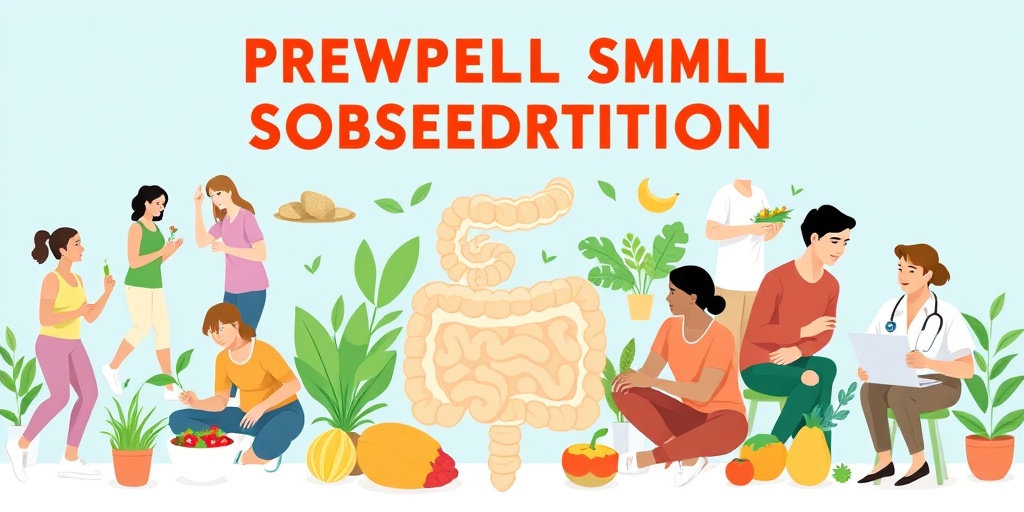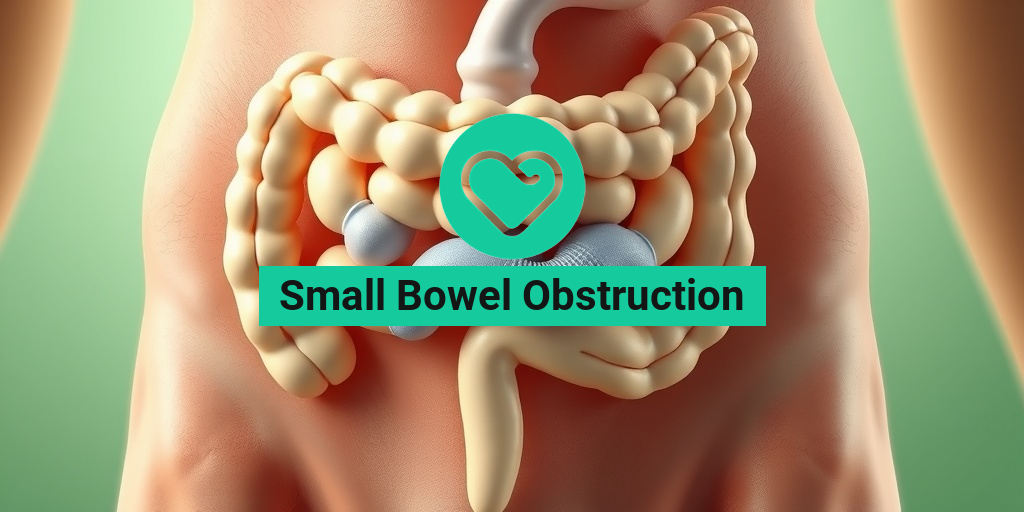What Is Small Bowel Obstruction?
Small bowel obstruction (SBO) is a serious medical condition that occurs when there is a blockage in the small intestine, preventing the normal passage of food, fluids, and gas. This obstruction can be partial or complete and can lead to significant complications if not treated promptly. The small intestine plays a crucial role in digestion, absorbing nutrients, and moving waste through the digestive tract. When an obstruction occurs, it can disrupt these vital functions, leading to discomfort and potentially life-threatening situations.
Causes of Small Bowel Obstruction
There are several potential causes of small bowel obstruction, including:
- Adhesions: Scar tissue from previous surgeries can create bands that bind parts of the intestine together.
- Hernias: Portions of the intestine can protrude through weak spots in the abdominal wall.
- Intestinal tumors: Growths can block the passage of food and fluids.
- Inflammatory bowel diseases: Conditions like Crohn’s disease can cause swelling and narrowing of the intestine.
- Volvulus: This occurs when a section of the intestine twists around itself, leading to obstruction.
Understanding the underlying causes of small bowel obstruction is essential for effective management and treatment. If you suspect you or someone you know may be experiencing symptoms of SBO, it’s crucial to seek medical attention promptly.
Small Bowel Obstruction Symptoms
The symptoms of small bowel obstruction can vary depending on the severity and duration of the blockage. Common signs to watch for include:
- Abdominal pain: This is often crampy and may come and go.
- Vomiting: This may include bile or fecal matter if the obstruction is severe.
- Abdominal distension: A swollen abdomen can indicate trapped gas and fluids.
- Constipation: Inability to pass gas or stool is a key indicator of obstruction.
- Lack of appetite: Nausea and discomfort can lead to a decreased desire to eat.
When to Seek Medical Attention
If you experience any combination of these symptoms, especially severe abdominal pain or persistent vomiting, it is essential to seek medical attention immediately. Small bowel obstruction can lead to serious complications, including:
- Ischemia: Reduced blood flow to the intestine can cause tissue death.
- Perforation: A hole in the intestine can lead to infection and peritonitis.
- Dehydration: Vomiting and inability to eat can lead to significant fluid loss.
Timely diagnosis and treatment are crucial. Medical professionals may use imaging techniques such as an X-ray or CT scan to confirm the presence of an obstruction and determine its cause. Treatment options may include non-surgical methods, such as bowel rest and hydration, or surgical intervention to remove the blockage.
Managing Small Bowel Obstruction
Management of small bowel obstruction often involves a multidisciplinary approach. Depending on the cause and severity, treatment may include:
- Dietary changes: A small bowel obstruction diet may be recommended to ease symptoms and promote recovery.
- Medications: Pain relief and anti-nausea medications can help manage symptoms.
- Surgery: In cases where conservative management fails, surgical options may be necessary to remove the obstruction.
For more detailed information on managing small bowel obstruction and its implications, consider visiting Yesil Health AI, a valuable resource for evidence-based health answers.
In conclusion, small bowel obstruction is a serious condition that requires prompt attention. Recognizing the symptoms and understanding the potential causes can help in seeking timely medical care, ultimately leading to better outcomes. If you or someone you know is experiencing symptoms, don’t hesitate to reach out to a healthcare professional. Your health is worth it! 🌟

Causes of Small Bowel Obstruction
Small bowel obstruction (SBO) occurs when there is a blockage in the small intestine, preventing the normal passage of digestive contents. Understanding the causes of SBO is crucial for effective diagnosis and treatment. Here are some of the most common causes:
Adhesions
One of the leading causes of small bowel obstruction is adhesions, which are bands of scar tissue that can form after abdominal surgery. These adhesions can bind the intestines together or to other organs, leading to a blockage. In fact, studies suggest that up to 75% of SBO cases are due to adhesions.
Hernias
A hernia occurs when an organ or tissue protrudes through a weak spot in the abdominal wall. This can lead to a strangulated hernia, where the blood supply to the affected area is compromised, resulting in an obstruction. Common types of hernias that can cause SBO include inguinal and umbilical hernias.
Intestinal Tumors
Both benign and malignant tumors can lead to small bowel obstruction. Tumors can grow within the intestinal lumen or compress the intestine from the outside, causing a blockage. Regular screenings and monitoring are essential, especially for individuals at higher risk of gastrointestinal cancers.
Inflammatory Bowel Disease (IBD)
Conditions such as Crohn’s disease and ulcerative colitis can cause inflammation and scarring in the intestines, leading to strictures or narrowing of the bowel. These strictures can obstruct the passage of food and fluids, resulting in SBO.
Volvulus
Volvulus is a condition where a portion of the intestine twists around itself, leading to a blockage. This can cut off blood supply to the affected area, making it a medical emergency that requires immediate attention.
Intestinal Ischemia
When blood flow to the intestines is reduced, it can lead to intestinal ischemia, which may cause swelling and obstruction. This condition can arise from various factors, including blood clots or narrowed blood vessels.
Foreign Bodies
Ingesting foreign objects, particularly in children, can lead to small bowel obstruction. Items such as toys, coins, or food that cannot be digested can cause a blockage in the intestines.
Risk Factors for Small Bowel Obstruction
Identifying the risk factors associated with small bowel obstruction can help in early detection and prevention. Here are some key risk factors to consider:
Previous Abdominal Surgery
Individuals who have undergone abdominal surgery are at a higher risk of developing adhesions, which can lead to SBO. The more surgeries a person has had, the greater the risk of complications.
Age
As people age, the risk of developing conditions that can lead to SBO increases. Older adults may have more chronic health issues, such as IBD or tumors, that contribute to the likelihood of obstruction.
Chronic Conditions
Chronic conditions like diabetes and cancer can increase the risk of SBO. These conditions may lead to changes in bowel function or the development of tumors that can obstruct the intestines.
Family History
A family history of gastrointestinal disorders can also be a risk factor. Genetic predispositions may increase the likelihood of conditions such as IBD or certain types of cancer, which can lead to SBO.
Dietary Factors
A diet low in fiber can contribute to constipation, which may increase the risk of bowel obstructions. Ensuring a balanced diet rich in fruits, vegetables, and whole grains can help maintain healthy bowel function.
Medications
Certain medications, particularly those that affect bowel motility, can increase the risk of SBO. Opioids, for example, are known to slow down intestinal movement, potentially leading to constipation and obstruction.
Understanding the causes and risk factors of small bowel obstruction is essential for prevention and timely intervention. If you or someone you know is experiencing symptoms such as abdominal pain, bloating, or vomiting, it is crucial to seek medical attention promptly. 🩺

Diagnosing Small Bowel Obstruction
Diagnosing small bowel obstruction (SBO) is a critical step in managing this potentially life-threatening condition. The diagnosis typically involves a combination of patient history, physical examination, and various imaging techniques.
Patient History and Symptoms
The first step in diagnosing SBO is taking a detailed patient history. Common symptoms that may indicate a small bowel obstruction include:
- Abdominal pain: Often crampy and intermittent, pain may become more severe as the obstruction progresses.
- Nausea and vomiting: Patients may experience persistent nausea, often accompanied by vomiting, which may contain bile.
- Abdominal distension: A swollen abdomen is a common sign, as gas and fluids accumulate.
- Changes in bowel habits: Patients may report constipation or the inability to pass gas.
Physical Examination
During a physical examination, healthcare providers will look for signs of SBO, such as:
- Abdominal tenderness: The abdomen may be tender to touch, particularly in the area of the obstruction.
- Bowel sounds: Auscultation may reveal high-pitched bowel sounds or, in some cases, a complete absence of sounds.
- Signs of dehydration: Patients may exhibit signs such as dry mucous membranes or decreased skin turgor.
Imaging Techniques
Once a physical examination suggests SBO, imaging studies are often employed to confirm the diagnosis. Common imaging techniques include:
- X-ray: An abdominal X-ray can reveal air-fluid levels and distended loops of bowel, indicating an obstruction.
- CT scan: A CT scan of the abdomen is more definitive and can help identify the location and cause of the obstruction.
- Ultrasound: Particularly useful in pediatric cases, ultrasound can help visualize bowel distension and fluid accumulation.
In some cases, additional tests such as blood tests may be performed to assess for electrolyte imbalances or signs of infection. Early diagnosis is crucial, as timely intervention can significantly improve outcomes for patients with small bowel obstruction. 🚑
Complications of Small Bowel Obstruction
If left untreated, small bowel obstruction can lead to serious complications that may threaten a patient’s life. Understanding these complications is essential for both patients and healthcare providers.
Strangulation and Ischemia
One of the most severe complications of SBO is strangulation, where the blood supply to a section of the bowel is compromised. This can lead to:
- Ischemia: The affected bowel segment may become ischemic, leading to tissue death.
- Perforation: If the ischemic bowel tissue dies, it can perforate, causing intestinal contents to spill into the abdominal cavity, leading to peritonitis.
Dehydration and Electrolyte Imbalance
Patients with SBO often experience significant fluid loss due to vomiting and inability to absorb nutrients. This can result in:
- Dehydration: Symptoms may include dry mouth, decreased urine output, and dizziness.
- Electrolyte imbalances: Loss of electrolytes such as sodium and potassium can lead to serious complications, including cardiac arrhythmias.
Infection
As the obstruction progresses, the risk of infection increases. This can manifest as:
- Peritonitis: Inflammation of the peritoneum can occur if bowel perforation happens, leading to severe abdominal pain and systemic infection.
- Sepsis: A severe infection can lead to sepsis, a life-threatening condition requiring immediate medical attention.
Long-term Consequences
Even after successful treatment, patients may face long-term consequences such as:
- Adhesions: Scar tissue can form after surgery, potentially leading to future obstructions.
- Chronic pain: Some patients may experience ongoing abdominal pain or discomfort.
Recognizing the signs and symptoms of small bowel obstruction and understanding its potential complications can empower patients and caregivers to seek timely medical intervention. Early diagnosis and treatment are key to preventing serious outcomes. 🩺

Treatment Options for Small Bowel Obstruction
Small bowel obstruction (SBO) is a serious condition that occurs when the small intestine is partially or completely blocked. This blockage can lead to severe complications if not treated promptly. Understanding the treatment options available is crucial for effective management. Here, we’ll explore the various approaches to treating small bowel obstruction.
1. Initial Assessment and Diagnosis
Before any treatment can begin, a thorough assessment is necessary. This typically involves:
- Medical History: Discussing symptoms such as abdominal pain, vomiting, and constipation.
- Physical Examination: A healthcare provider will check for signs of tenderness, distension, or bowel sounds.
- Imaging Tests: X-rays, CT scans, or ultrasounds may be used to confirm the diagnosis and determine the cause of the obstruction.
2. Non-Surgical Management
In some cases, small bowel obstruction can be managed without surgery. This approach is often suitable for partial obstructions or when the cause is expected to resolve on its own. Non-surgical management may include:
- NPO Status: Patients are advised not to eat or drink to allow the bowel to rest.
- Nasogastric Tube (NG Tube): This tube is inserted through the nose into the stomach to relieve pressure by draining excess fluid and gas.
- IV Fluids: Intravenous fluids are administered to prevent dehydration and maintain electrolyte balance.
3. Surgical Intervention
If non-surgical methods fail or if the obstruction is complete, surgical intervention may be necessary. The type of surgery performed depends on the underlying cause of the obstruction:
- Adhesiolysis: This procedure involves removing adhesions (scar tissue) that may be causing the blockage.
- Resection: In cases where a tumor or damaged section of the bowel is present, that part may need to be surgically removed.
- Stenting: In some cases, a stent may be placed to keep the bowel open.
4. Post-Treatment Care
After treatment, whether surgical or non-surgical, monitoring is essential. Patients may need to follow a specific diet and gradually reintroduce foods. Regular follow-ups with healthcare providers are crucial to ensure recovery and prevent recurrence.
Preventing Small Bowel Obstruction
While not all cases of small bowel obstruction can be prevented, there are several strategies that can help reduce the risk. Understanding these preventive measures is vital for maintaining digestive health.
1. Dietary Considerations
A well-balanced diet plays a significant role in preventing small bowel obstruction. Consider the following:
- High-Fiber Foods: Incorporate fruits, vegetables, and whole grains to promote healthy digestion and prevent constipation.
- Stay Hydrated: Drinking plenty of fluids helps keep the digestive system functioning smoothly.
- Avoid Excessive Processed Foods: Limit intake of foods high in fat and sugar, which can contribute to digestive issues.
2. Regular Exercise
Engaging in regular physical activity can help maintain a healthy digestive system. Aim for at least 30 minutes of moderate exercise most days of the week. Activities such as walking, swimming, or cycling can promote bowel motility and reduce the risk of obstructions.
3. Manage Underlying Conditions
Conditions such as Crohn’s disease, previous abdominal surgeries, or certain cancers can increase the risk of small bowel obstruction. Managing these conditions effectively with the help of healthcare providers can significantly reduce the likelihood of developing SBO.
4. Avoiding Smoking and Excessive Alcohol
Both smoking and excessive alcohol consumption can negatively impact digestive health. Quitting smoking and moderating alcohol intake can help reduce the risk of small bowel obstruction and improve overall health.
By understanding the treatment options and preventive measures for small bowel obstruction, individuals can take proactive steps towards better digestive health. Remember, if you experience symptoms of SBO, seek medical attention promptly to ensure the best possible outcome. 🌟

Frequently Asked Questions about Small Bowel Obstruction
What is a Small Bowel Obstruction?
A small bowel obstruction occurs when there is a blockage in the small intestine, preventing food, fluids, and gas from passing through. This condition can lead to serious complications if not treated promptly.
What are the common causes of Small Bowel Obstruction?
- Adhesions from previous surgeries
- Hernias
- Inflammatory bowel diseases
- Tumors
- Intussusception (when one part of the intestine telescopes into another)
How is Small Bowel Obstruction diagnosed?
Diagnosis typically involves a combination of physical examinations, imaging tests such as X-rays or CT scans, and sometimes blood tests to assess the severity of the obstruction.
What are the symptoms of Small Bowel Obstruction?
- Abdominal pain and cramping
- Vomiting
- Inability to pass gas or stool
- Swelling of the abdomen
- Loss of appetite
What is the treatment for Small Bowel Obstruction?
Treatment options depend on the cause and severity of the obstruction. They may include:
- Hospitalization for observation and supportive care
- Nasogastric tube insertion to relieve pressure
- Surgery to remove the obstruction or repair the underlying cause
What is the role of diet in managing Small Bowel Obstruction?
After recovery, a small bowel obstruction diet may be recommended, focusing on easily digestible foods and gradual reintroduction of regular foods. Always consult a healthcare provider for personalized dietary advice.
How does Small Bowel Obstruction differ from Ileus?
While both conditions involve a lack of movement in the intestines, small bowel obstruction is typically caused by a physical blockage, whereas ileus is often due to a temporary cessation of bowel activity, often following surgery or due to certain medications.
What are the potential complications of Small Bowel Obstruction?
If left untreated, a small bowel obstruction can lead to serious complications such as:
- Intestinal perforation
- Infection
- Sepsis
- Dehydration and electrolyte imbalances
When should I seek medical attention for Small Bowel Obstruction?
If you experience severe abdominal pain, persistent vomiting, or inability to pass gas or stool, it is crucial to seek medical attention immediately. Early intervention can prevent serious complications.




